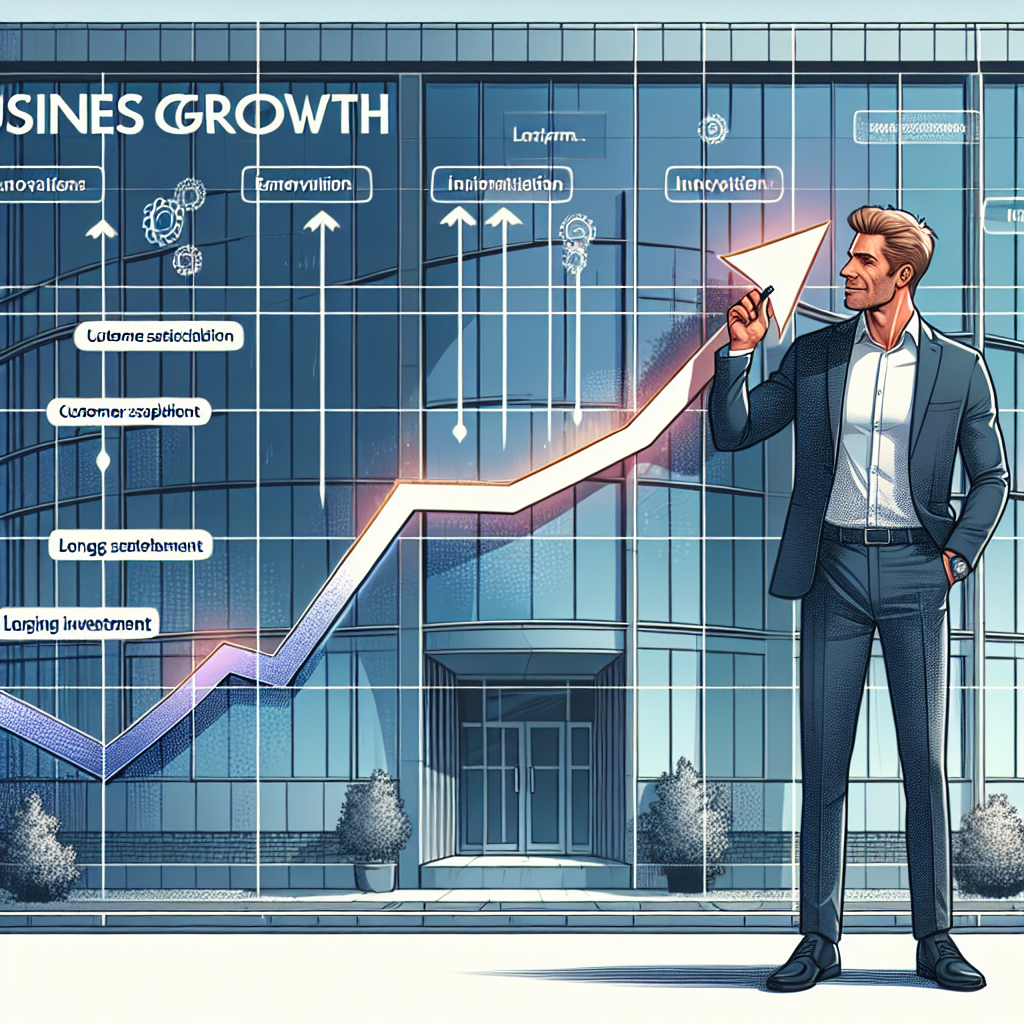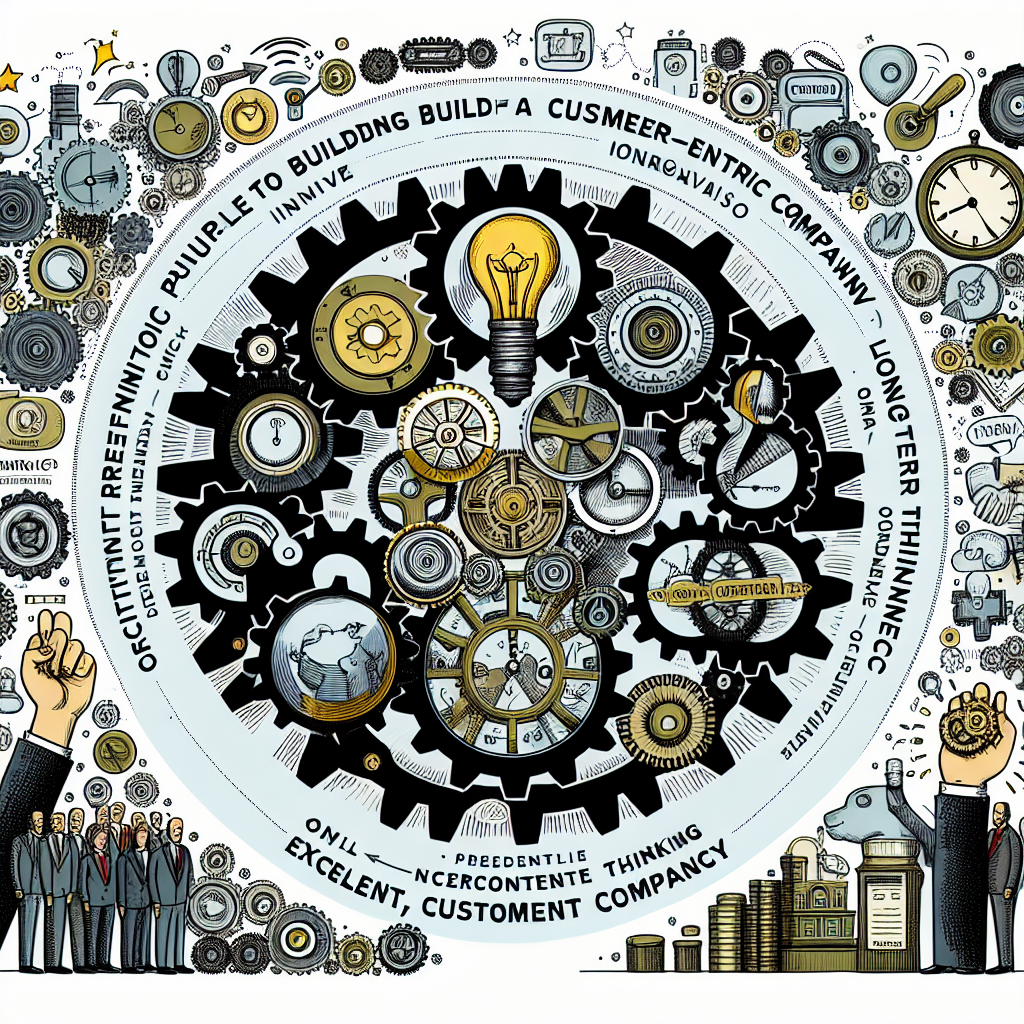Jeff Bezos tips för att bygga en kundfokuserad verksamhet
Understanding the Customer: How Jeff Bezos Prioritizes Customer Needs
Jeff Bezos, the founder and CEO of Amazon, is known for his relentless focus on customer satisfaction. He has built one of the most successful and customer-centric businesses in the world, and his strategies and tips for building a customer-focused business are worth paying attention to. In this article, we will explore some of Jeff Bezos’ tips for building a customer-focused business and how you can apply them to your own organization.
The first and most important tip from Jeff Bezos is to start with the customer and work backwards. This means that instead of starting with a product or service and trying to find customers for it, you should start with the customer and their needs and then build your product or service around that. This approach ensures that your business is always focused on meeting the needs and wants of your customers, rather than just trying to sell them something.
Another tip from Jeff Bezos is to listen to your customers and use their feedback to improve your business. Amazon has a culture of constantly listening to their customers and using their feedback to make improvements. This has allowed them to continuously evolve and stay ahead of their competitors. As a business owner, it is important to actively seek out feedback from your customers and use it to make necessary changes and improvements to your products or services.
In addition to listening to your customers, Jeff Bezos also emphasizes the importance of understanding your customers. This means not only understanding their needs and wants, but also understanding their behaviors, preferences, and pain points. By understanding your customers, you can tailor your products or services to better meet their needs and provide a more personalized experience. This can lead to increased customer satisfaction and loyalty.
One of the ways Amazon has been able to understand their customers is through data. Jeff Bezos believes in the power of data and uses it to make informed decisions for his business. By collecting and analyzing data, you can gain valuable insights into your customers’ behaviors and preferences, which can help you make strategic business decisions. This data-driven approach has been a key factor in Amazon’s success and can be applied to any business, regardless of size.
Another important tip from Jeff Bezos is to be obsessed with your customers. This means constantly thinking about how you can improve their experience and meet their needs. Amazon has a team dedicated to customer obsession, and this mindset is ingrained in their company culture. As a business owner, it is important to always keep your customers top of mind and make decisions that will benefit them.
In addition to being obsessed with your customers, Jeff Bezos also stresses the importance of being flexible and adaptable. In today’s fast-paced business world, things are constantly changing, and it is important to be able to adapt to these changes. This includes being open to new ideas and constantly innovating to meet the changing needs of your customers. Amazon has been able to stay ahead of their competitors by being flexible and adapting to the ever-changing market.
Lastly, Jeff Bezos believes in the power of long-term thinking. He famously said, ”We are willing to be misunderstood for long periods of time.” This means that Amazon is willing to make decisions that may not be popular in the short-term, but will benefit the company and its customers in the long run. As a business owner, it is important to have a long-term vision and not get caught up in short-term gains. By focusing on the long-term, you can build a sustainable and customer-focused business.
In conclusion, Jeff Bezos’ tips for building a customer-focused business are centered around understanding and prioritizing the needs of your customers. By starting with the customer, listening to their feedback, understanding their behaviors, and being obsessed with their satisfaction, you can build a successful and customer-centric business. Additionally, being data-driven, flexible, and having a long-term vision are key factors in building a business that prioritizes customer needs. By applying these tips to your own organization, you can create a strong foundation for long-term success.
Innovative Strategies: Jeff Bezos’ Approach to Building a Customer-Centric Business
Jeff Bezos, the founder and CEO of Amazon, is known for his innovative strategies and relentless focus on customer satisfaction. He has built Amazon into one of the most successful and customer-centric businesses in the world. In this article, we will explore some of Jeff Bezos’ tips for building a customer-focused business.
First and foremost, Bezos believes in starting with the customer and working backwards. This means understanding the needs and wants of your customers and then designing your products and services to meet those needs. Bezos famously said, ”We’re not competitor obsessed, we’re customer obsessed. We start with what the customer needs and we work backwards.”
This customer-centric approach has been the driving force behind Amazon’s success. Bezos and his team constantly gather feedback from customers and use it to improve their products and services. This not only helps in retaining existing customers but also attracts new ones.
Another key strategy that Bezos follows is to constantly innovate and experiment. He believes that in order to stay ahead in the game, businesses must be willing to take risks and try new things. This is evident in Amazon’s continuous expansion into new markets and ventures, such as Amazon Web Services and Amazon Prime.
Bezos also emphasizes the importance of having a long-term vision. He famously said, ”If we think long-term, we can accomplish things that we couldn’t otherwise accomplish.” This long-term thinking has allowed Amazon to invest in new technologies and initiatives that may not yield immediate profits but have the potential to revolutionize the industry in the long run.
In addition to these strategies, Bezos also stresses the importance of having a strong company culture. He believes that a company’s culture is its DNA and it should be customer-centric. At Amazon, this is evident in their 14 leadership principles, which include customer obsession, ownership, and innovation. These principles guide the decision-making process and ensure that the customer remains at the center of everything the company does.
Bezos also believes in the power of data and analytics. Amazon is known for its data-driven approach to decision making. They collect and analyze vast amounts of data to understand customer behavior and preferences, which helps them make informed business decisions. This data-driven approach has allowed Amazon to personalize the customer experience and offer targeted recommendations, leading to increased customer satisfaction and loyalty.
Another important aspect of building a customer-centric business, according to Bezos, is to constantly raise the bar. He believes that businesses should never settle for mediocrity and should always strive to improve and exceed customer expectations. This is evident in Amazon’s continuous efforts to improve their delivery times, expand their product offerings, and provide exceptional customer service.
Bezos also emphasizes the importance of being adaptable and flexible. In today’s fast-paced business world, it is crucial for businesses to be able to adapt to changing market trends and customer needs. Amazon has been able to stay ahead of the curve by constantly evolving and adapting to the ever-changing business landscape.
Lastly, Bezos believes in the power of listening to customers. He encourages businesses to actively seek feedback from customers and use it to improve their products and services. This not only helps in building a loyal customer base but also creates a sense of trust and transparency between the company and its customers.
In conclusion, Jeff Bezos’ approach to building a customer-centric business is based on understanding the needs of customers, constantly innovating and experimenting, having a long-term vision, fostering a strong company culture, utilizing data and analytics, constantly raising the bar, being adaptable, and listening to customers. By following these tips, businesses can create a customer-focused culture that will lead to long-term success and growth, just like Amazon.
Data-Driven Decision Making: Lessons from Jeff Bezos’ Customer-Obsessed Mindset
Jeff Bezos, the founder and CEO of Amazon, is known for his customer-obsessed mindset. He has built one of the most successful and customer-centric businesses in the world. With a net worth of over $200 billion, Bezos’ approach to business has clearly paid off. So, what can we learn from his data-driven decision making and customer-focused strategies?
First and foremost, Bezos believes in the power of data. He once said, ”What we need to do is always lean into the future; when the world changes around you and when it changes against you – what used to be a tailwind is now a headwind – you have to lean into that and figure out what to do because complaining isn’t a strategy.” This quote perfectly encapsulates Bezos’ approach to data-driven decision making. He understands that in order to stay ahead of the game, businesses must constantly analyze and utilize data to make informed decisions.
One of the key ways Bezos uses data is through customer feedback. He believes that listening to customers is crucial for building a successful business. In fact, Amazon has a dedicated team called ”Customer Obsession” that is responsible for collecting and analyzing customer feedback. This team is constantly looking for ways to improve the customer experience and make data-driven decisions based on customer needs and preferences.
But it’s not just about collecting data, it’s about using it effectively. Bezos has a famous saying, ”Good intentions don’t work, but mechanisms do.” This means that simply having good intentions to improve the customer experience is not enough, there must be a mechanism in place to actually make it happen. For Amazon, this mechanism is their data-driven decision making process. They use data to identify customer pain points and then come up with solutions to address them.
Another important aspect of Bezos’ customer-obsessed mindset is his focus on the long-term. He famously said, ”We are willing to be misunderstood for long periods of time.” This means that Amazon is willing to make decisions that may not be popular in the short-term, but will benefit the customer in the long-term. This is evident in their decision to invest heavily in technologies like Prime and Alexa, even when they were not profitable at first. But now, these services have become integral parts of the Amazon experience and have contributed to their success.
In addition to data, Bezos also emphasizes the importance of innovation. He believes that businesses must constantly innovate and evolve in order to stay relevant and meet the changing needs of customers. This is why Amazon is constantly experimenting with new ideas and services, such as their recent foray into the healthcare industry with the acquisition of PillPack. Bezos understands that in order to maintain a customer-focused mindset, businesses must be willing to take risks and try new things.
Lastly, Bezos believes in the power of simplicity. He once said, ”The best customer service is if the customer doesn’t need to call you, doesn’t need to talk to you. It just works.” This quote highlights the importance of making the customer experience as seamless and effortless as possible. Amazon’s one-click ordering and fast delivery options are a testament to this belief. By simplifying the buying process, Amazon has made it easier for customers to make purchases and has ultimately improved their overall experience.
In conclusion, Jeff Bezos’ customer-obsessed mindset and data-driven decision making have been key factors in Amazon’s success. By constantly analyzing data, listening to customers, and focusing on the long-term, Bezos has built a customer-centric business that continues to thrive. As businesses strive to build a customer-focused culture, they can learn valuable lessons from Bezos and his approach to data-driven decision making.
Creating a Culture of Customer Service: Jeff Bezos’ Key Principles for Success
Jeff Bezos, the founder and CEO of Amazon, is known for his relentless focus on customer service. He has built a multi-billion dollar empire by putting the customer at the center of everything he does. In this article, we will explore Jeff Bezos’ key principles for creating a culture of customer service and how you can apply them to your own business.
The first principle that Jeff Bezos emphasizes is to start with the customer and work backwards. This means understanding the needs and wants of your customers and then designing your products and services to meet those needs. Bezos believes that this approach is crucial for long-term success, as it allows you to stay ahead of the competition and continuously improve your offerings.
To truly understand your customers, Bezos suggests using data and metrics to gain insights into their behavior and preferences. This data-driven approach allows you to make informed decisions and tailor your products and services to meet the specific needs of your customers. Bezos famously said, ”What’s dangerous is not to evolve.”
Another key principle that Bezos follows is to be obsessed with your customers. This means going above and beyond to exceed their expectations and provide exceptional service. Bezos believes that this level of obsession is necessary to create loyal customers who will keep coming back to your business.
One way to demonstrate this obsession is by listening to your customers and taking their feedback seriously. Bezos encourages businesses to have a mechanism in place for customers to provide feedback and then act on that feedback to improve their experience. This not only shows that you value your customers’ opinions but also helps you identify areas for improvement.
In addition to listening to your customers, Bezos also stresses the importance of constantly innovating and experimenting. He believes that businesses should always be looking for ways to improve and evolve, even if it means taking risks. This mindset has allowed Amazon to continuously introduce new products and services, such as Amazon Prime and Amazon Web Services, which have revolutionized the e-commerce and cloud computing industries.
Bezos also believes in the power of simplicity. He encourages businesses to focus on the essentials and eliminate anything that does not add value for the customer. This not only helps to streamline operations but also ensures that the customer experience is not bogged down by unnecessary features or processes.
Another key principle that Bezos follows is to hire and retain the best talent. He believes that a company’s success is directly tied to the quality of its employees. Bezos looks for individuals who are passionate about serving customers and are willing to go the extra mile to make them happy. He also emphasizes the importance of creating a positive and inclusive work culture to attract and retain top talent.
Lastly, Bezos believes in being patient and taking a long-term view. He understands that building a customer-focused business takes time and requires a commitment to continuous improvement. Bezos famously said, ”We are willing to be misunderstood for long periods of time.” This mindset has allowed Amazon to make bold moves and investments that have paid off in the long run.
In conclusion, Jeff Bezos’ key principles for creating a culture of customer service are to start with the customer and work backwards, be obsessed with your customers, use data and metrics to gain insights, constantly innovate and experiment, focus on simplicity, hire and retain the best talent, and take a long-term view. By following these principles, you can build a customer-focused business that will stand the test of time and achieve long-term success. As Bezos himself said, ”If you do build a great experience, customers tell each other about that. Word of mouth is very powerful.”
Continuous Improvement: Jeff Bezos’ Advice for Sustaining a Customer-Focused Business
Jeff Bezos, the founder and CEO of Amazon, is known for his relentless focus on customer satisfaction. He has built one of the most successful and customer-centric businesses in the world, and his strategies and tips for sustaining a customer-focused business are invaluable for any business owner or leader.
One of the key principles that Bezos emphasizes is the importance of continuous improvement. He believes that in order to stay ahead in the ever-changing business landscape, a company must constantly strive to improve and innovate. This is especially true when it comes to customer satisfaction.
Bezos believes that a customer-focused business should always be looking for ways to make the customer experience better. This could mean improving the quality of products or services, streamlining processes, or finding new ways to engage with customers. By constantly seeking ways to improve, a business can stay ahead of the competition and keep customers happy.
Another important aspect of building a customer-focused business, according to Bezos, is to have a long-term perspective. He famously said, ”We are willing to be misunderstood for long periods of time.” This means that a business should not be solely focused on short-term profits, but rather on building a strong and sustainable relationship with its customers.
Bezos also stresses the importance of listening to customers. He believes that customers are the best source of information for a business, and their feedback should be taken seriously. By listening to customers, a business can identify areas for improvement and make necessary changes to better meet their needs.
In addition to listening to customers, Bezos also encourages businesses to listen to their employees. He believes that a happy and engaged workforce is crucial for a successful business. By creating a positive work culture and empowering employees to share their ideas and suggestions, a business can foster a customer-focused mindset within the organization.
One of the most well-known strategies that Bezos has implemented at Amazon is the ”customer obsession” principle. This means that every decision made at the company is based on what is best for the customer. Bezos believes that by putting the customer first, everything else will fall into place.
Another important aspect of building a customer-focused business is to be data-driven. Bezos is a strong advocate for using data to make decisions and improve processes. By analyzing customer data, a business can gain valuable insights into their preferences and behaviors, and use this information to tailor their products and services to better meet their needs.
Bezos also emphasizes the importance of being adaptable and open to change. In today’s fast-paced business world, things can change quickly, and a business must be able to adapt in order to stay relevant. This could mean embracing new technologies, changing business strategies, or even entering new markets. By being open to change, a business can continue to evolve and meet the ever-changing needs of its customers.
Finally, Bezos believes that a customer-focused business should always be experimenting and taking risks. He encourages businesses to try new things and not be afraid of failure. By taking risks, a business can discover new ways to improve and innovate, ultimately leading to a better customer experience.
In conclusion, Jeff Bezos’ tips for building a customer-focused business are centered around continuous improvement, long-term thinking, listening to customers and employees, being data-driven, and being adaptable and open to change. By following these principles, a business can create a strong and sustainable relationship with its customers, leading to long-term success. As Bezos himself said, ”We see our customers as invited guests to a party, and we are the hosts. It’s our job every day to make every important aspect of the customer experience a little bit better.”




















